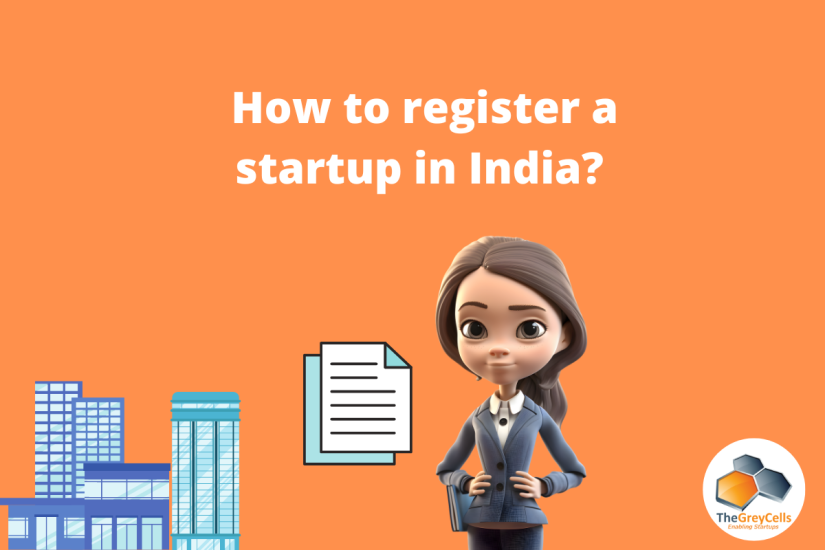How to register a startup in India?


It is mandatory to register a company under the Companies Act, 2013 in order to start it. While registering, it is essential to find a suitable business structure, correct documents, and the whole process.
In this article, we will share all the essentials that you need to know before starting a startup.
Types Of Companies under the Companies Act, 2013
Legally speaking, there are various types of companies available under the Companies Act, 2013 in India. Among them, the most common types of companies are:
Private Limited Company (Pvt. Ltd.)
A Private Limited Company (Pvt. Ltd.) is a privately owned and separate legal entity from the founders. It includes the company’s shareholders, stakeholders, and board of directors. In addition, every person working for the company is considered as an employee.
Private Limited Companies are mandated to undergo an audit, apart from filing tax returns and ROC returns. However, taxes are spared for the first three years of business under Startup India. Hence, they enjoy higher benefits on depreciation.
One Person Company (OPC)
One Person Company or OPC is owned and promoted by only one individual. It is ideal for solopreneurs who are looking for limited liability.
An OPC has to act in accordance with limited ROC and also file regular tax returns. However, similar to a Private Limited Company, taxes are exempted for the first 3 years of business under Startup India. So, the enjoy even higher benefits on depreciation, without any tax on dividend distribution.
Public Limited Company (PLC)
A Public Limited Company (PLC) is a publicly owned and a separate legal entity formed by an association of members unified under the Company Law. The members’ liability is limited to the amount of shares they hold.
A PLC is ideal for the businesses which have a higher turnover and want to raise funds from the public, as they enjoy certain exemptions under the law. Apart from filing tax returns, mandatory order have to be made on them.
Others
Apart from the majority of the companies discussed above, some of the other company types include:
- Cooperative
- Unlimited Company
- Partnership Firms
- Proprietorship
- Hindu Undivided Family
Read more: 7 Types of partnership?
Find Your Company Type
Before you register your startup with the government, it’s extremely important to choose the right type of business structure for your company. It’s because the company type that you choose will determine your returns on Income Tax.
For instance, a private or public limited company has to file both income tax returns and annual returns, whereas a solopreneur only has to file for income tax returns. In addition, a private or public limited company is also required to get its account audited annually, including expenditure on tax filing experts, accountants and auditors.
Therefore the need of choosing the right business structure becomes extremely crucial due to the legal compliances.
Investors always prefer a recognised and legal business type, over other investor-friendly companies. In addition, they may be more comfortable while investing in a relevant idea.
Therefore, you must considered the following aspects before deciding upon the type for your company:
Number of Owners & Partners
If your business has only one owner for complete initial investment, a One Person Company is perfect. However, a business with more than one owner, which seeks other party’s investment, is suitable as a Private Limited Company or a Limited Liability Partnership.
Initial Investment
A Partnership, Sole Proprietor, or HUF could be ideal for a business willing to invest less initially. On the other hand, a business seeking greater initial investment whose profits could sour, an LLP, OPC, or Pvt. Ltd. Company is ideal.
Read more: How much startup funding you need?
Who will bear Entire Business Liability?
A Sole Proprietor, Partnership, or HUF have unlimited liability. Therefore, it is ideal for a business with high risk to personal assets, where the members are fine with bearing the entire liability in case of any default in loans in the profit sharing.
In contrast, if the members of a business are willing to bear a limited liability up to the amount of their contribution, a Pvt. Ltd. Company, a PLC, or an LLP our ideal as they maintain limited liability.
Read more: How to build startup privacy policy?
Applicable Income Tax Rate
For a Sole Proprietor, or an HUF, the rate of income tax applicable is as per the regular slab rates. In simple words, the business income is added to the individual income of the owner. However, the tax rate applicable for a Private Limited company, a Public Limited company, or Partnership, and others is 30%.
Investor’s Money
Investors trust in registered and legal entities over the ones that are not registered, even if they are profitable ones. Private Limited Companies and LLPs are more prone to get investment then sole proprietorship.
Documents Required
Now that you have decided your company type with the help of an expert, you will have to ensure that the documents required are available. These documents include:
- PAN card scanned copy
- Latest bank statement or electricity bill or gas bill or phone bill
- Scanned copy of voter’s ID or Passport
- Registered address’ utility bill
- Rental agreement notarized in English
- Passport sized photograph
You can send the scanned copies of these documents so as to begin the registration process. Keep the following formalities in mind while registering the business:
- The documents follow shop and establishment acts
- Registration documents of import and export are available from the Director General of Foreign Trade
- Registration documents are available of Software Technology Parks of India (STPI)
- The approval of RBI and FIPB is obtained for foreign investors in India

THE 7-STEP STARTUP SUCCESS FORMULA
I am not the only Business Coach around. There are many distinguished business coaches and gurus out there. At the end of the day, our aim is not just to give you knowledge and jargon.
In this book, I have mentioned 7 defined steps to reach your startup milestone, condensed with my 25 years of experience.
___ by Anu Khanchandani
How To Register a Startup in India?
The Ministry of Corporate Affairs (MCA) has introduced Form INC-29 to register a company in India, making the process a little shorter and easier. This form has merged some lengthy processes into one, including approving business name and application of incorporation. Thus, the process now requires only 7 days to incorporate a business online.
Here’s how the registration process follows:
Step 1: Acquire a DSC (Digital Signature Certificate)
You have to make an application to acquire DSC of directors after logging into the MCA portal. The process usually takes two days after the submission.
Step 2: Acquire a Director Identification Number (DIN)
Now, your business will be required to prepare Form INC-29. So, the business will have to acquire DIN, name approval, MOA and AOA, registered verification for office, appointment letters, and declaration in order to prepare for the Form.
Step 3: Make New registration on MCA portal
The business will have to file Form INC-29 once all the said documents are ready. The forms of company formation will have to be filed after which the Incorporation Certificate can be collected.
Step 4: Collect an Incorporation Certificate
As you receive the Certificate of Incorporation, a PAN can be acquired for the company along with a new bank account.
With these instructions, a company can be registered in India. However, you should get an expert opinion before getting a company registered in India.

THE 7-STEP STARTUP SUCCESS FORMULA
I am not the only Business Coach around. There are many distinguished business coaches and gurus out there. At the end of the day, our aim is not just to give you knowledge and jargon.
In this book, I have mentioned 7 defined steps to reach your startup milestone, condensed with my 25 years of experience.
___ by Anu Khanchandani
















Comments are closed.